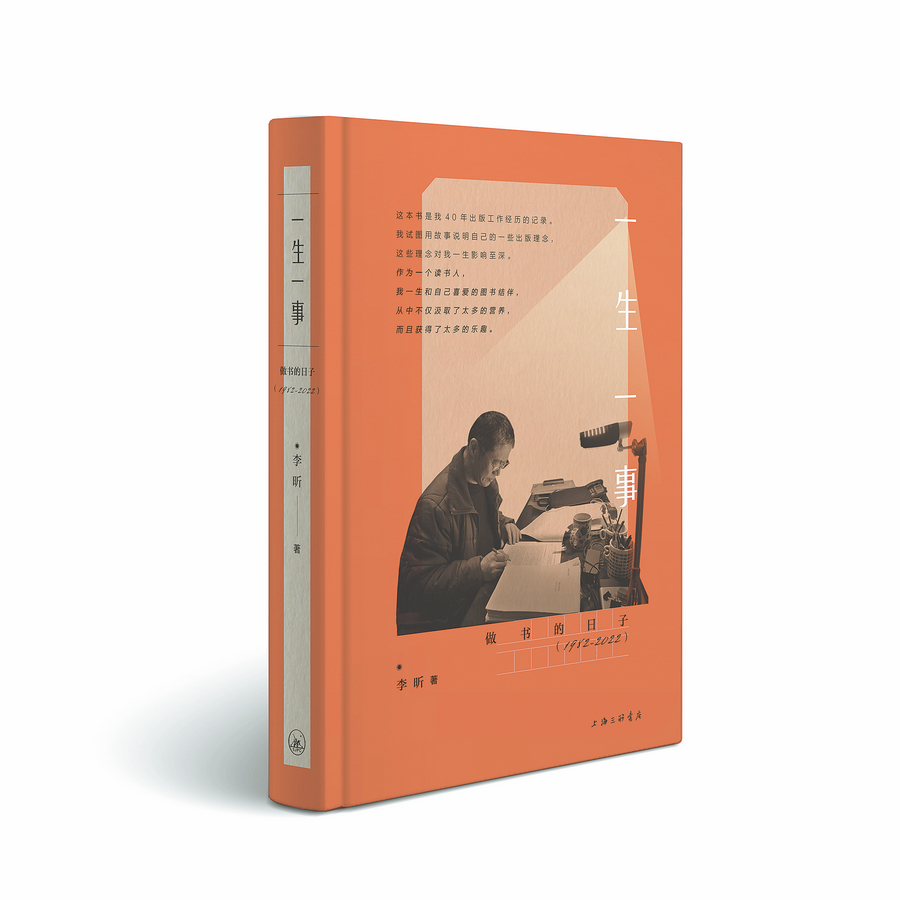

On the orange cover of the book Yisheng Yishi (roughly, a lifelong pursuit), a memoir by editor and publisher Li Xin about his four-decade career starting in 1982, is a black-and-white photo of him as a middle-aged man sitting at a desk under a lamp concentrating on a stack of papers — a draft of the Chinese version of Deng Xiaoping and the Transformation of China by US sociologist Ezra Feivel Vogel.
The book's publication in January 2013 marked the peak of his four-decade career, Li says. It has sold over 1.5 million copies.
On Douban, a major review aggregator in China, nearly 70,000 readers gave the book 9.3 points out of 10, ranking it in 18th place among the site's 250 top-rated books.
"It is absolutely the most important, difficult but successful book in my editing career," he says.
In Yisheng Yishi, Li outlines his career through important books that he worked on at what he identifies as four stages over the past 40 years.
He tells stories about producing books and his interactions with writers such as Vogel, Nobel laureate C.N. Yang, Louis Cha Leungyung and writer and translator Yang Jiang.
As he has worked at top Chinese publishers since 1982 as one of the first university graduates after the country resumed college entrance examinations in 1977 — namely, People's Literature Publishing House, Joint Publishing HK, SDX Joint Publishing Company and the Commercial Press — Li's experience involving more than 3,000 titles showcases the developmental arc of China's publishing industry throughout this period.
"This book is a record of my experience in publishing over the last 40 years, through which I try to present my perceptions of the industry," he says.
He doesn't only chronicle his successes.
"I hope all the regrets I record in the book will help my peers," he writes in an essay about the book.
Zheng Yong, deputy editor-in-chief of Commercial Press, says, "The book is not only Li Xin's personal memoir but a historical account of the contemporary publishing industry to pass down from generation to generation".
Li was born in Beijing in 1952.His love of books blossomed during childhood. His father, a professor of foreign literature at Tsinghua University, subscribed to Yiwen, a magazine devoted to the translation and introduction of foreign literature, and bought many novels from China and abroad. After his father finished a book, his two elder sisters would read it before passing it along to him.
From the beginning of 1968 until April 1969, Li worked at the library of the Affiliated High School of Peking University, where he read Don Quixote by Miguel de Cervantes and sci-fi books like Twenty Thousand Leagues Under the Sea by Jules Verne.
When Li worked in the countryside in Northeast China's Jilin province from 1969 to 1974, he took about 30 good books from the library with him, including ones by French writers Victor Hugo and Honore de Balzac.
Four years later, he passed the college entrance examination and enrolled at Wuhan University to study Chinese language and literature. Upon graduation, he chose to work at the People's Literature Publishing House, aspiring to become a book editor and a literary critic.
"Compared with my university classmates, I lacked sufficient academic experience to do scholarly research," he says. "And I'm not talented enough to be a writer or journalist."
At university, Li found that his remarks at literary symposiums often stood out because his experiences in the countryside endowed him with a realistic perspective from which to understand literature.